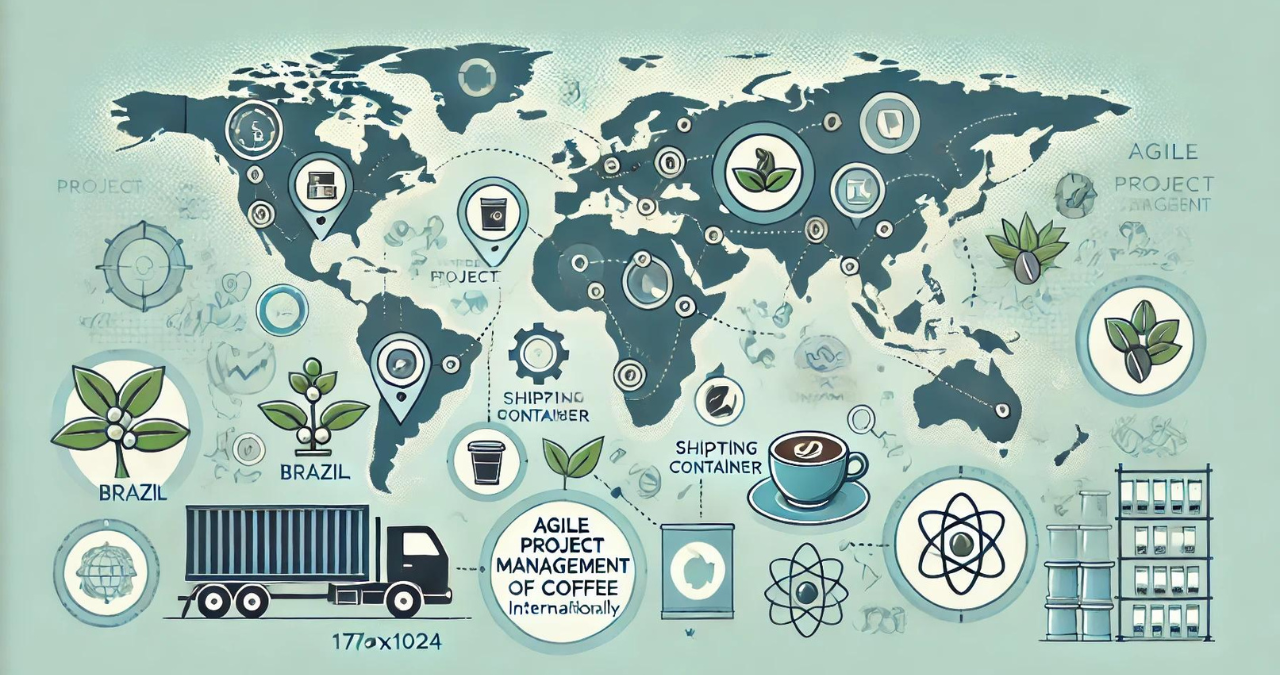Introduction
The coffee industry is a dynamic and vital sector with a global reach, influencing economies and cultures worldwide. As such, managing the intricacies of coffee production and distribution requires not just traditional management techniques but also innovative approaches that can adapt to the rapid changes and challenges of the international market. This is where “agile project management of coffee internationally” comes into play. This method offers a flexible, iterative approach that helps businesses in the coffee sector react swiftly to market changes, supply chain disruptions, and consumer demands, ensuring that they stay competitive and efficient.
The International Coffee Market
Coffee is one of the most traded commodities in the world, cultivated primarily in the equatorial regions of the Americas, Southeast Asia, and Africa. Brazil, Vietnam, Colombia, and Ethiopia are among the top coffee-producing countries, each with unique challenges and market dynamics. Internationally, the coffee market is not just about agriculture; it involves complex logistics, including processing, packaging, shipping, and retailing. Each stage presents its own challenges, from labor issues and political instability to environmental concerns and fluctuating market demands.
In navigating these challenges, “agile project management of coffee internationally” plays a crucial role. It enables producers and distributors to implement flexible strategies that can adapt to sudden market changes or supply chain disruptions. For instance, agile methodologies can help manage risks associated with delayed shipments or quality issues, ensuring that the final product meets the consumer’s expectations regardless of intervening variables.
Principles of Agile Project Management
Agile project management is characterized by its flexibility, iterative process, and its focus on continuous improvement. The core principles include:
- Customer satisfaction through early and continuous delivery of valuable coffee products.
- Welcoming changing requirements, even late in production, to enhance customer advantage.
- Delivering working products frequently, from a couple of weeks to a couple of months, with a preference for a shorter timescale.
- Sustainable development can maintain a constant pace indefinitely.
- Close daily cooperation between business people and developers throughout the project.
- Face-to-face conversation is the best form of communication (co-location).
- Working products are the primary measure of progress.
Applying these principles to the coffee industry allows businesses to respond more rapidly to market trends and consumer preferences, essential for staying competitive in a global market.
Implementing Agile Practices in Coffee Production
Implementing agile methodologies in coffee production can significantly enhance operational efficiency and responsiveness. For example, a coffee producer in Brazil might use agile practices to quickly alter production processes in response to unexpected weather conditions that threaten crop yield. The producer can mitigate risks and reduce waste by adopting a more flexible production schedule and using technology to monitor crop health.
Moreover, agile project management facilitates better communication and collaboration among teams, which is crucial when dealing with the various stages of coffee production—from harvesting and processing to packaging and distribution. This enhanced communication helps align the objectives across different departments, ensuring that everyone works towards the same goal of efficiently delivering high-quality coffee to the market.
Agile Strategies in Coffee Distribution and Retail
In distribution and retail, agile project management helps companies adapt quickly to new consumer trends or changes in the supply chain. For instance, if a particular type of coffee suddenly becomes popular in Europe, retailers and distributors can quickly adjust their inventory and marketing strategies to capitalize on this trend, thanks to the agile frameworks in place. This responsiveness is critical to maintaining customer satisfaction and market share in a competitive industry.
Retail giants like Starbucks and smaller specialty coffee shops employ agile methodologies to manage their product offerings and marketing campaigns. This allows them to quickly pivot in response to consumer feedback or operational challenges. This agility has proven especially useful in the digital age, where online sales and marketing can change rapidly.
Future Directions and Technological Integration
As technology advances, its integration into agile project management of coffee internationally is becoming more pronounced. Innovations such as blockchain for traceability, IoT for crop monitoring, and AI for demand forecasting are enhancing the capabilities of agile methodologies. These technologies improve the efficiency and transparency of the coffee supply chain and help make more informed decisions quickly, which is at the heart of agile practices.
Predictive analytics, for example, can forecast changes in consumer preferences or identify potential supply chain disruptions before they happen, allowing companies to prepare and adapt without missing a beat. This proactive approach is crucial for maintaining the supply chain’s integrity and ensuring that the end product meets the highest quality and sustainability standards.
Conclusion
Agile project management of coffee internationally is more than just a buzzword; it’s a crucial methodology shaping the coffee industry’s future. By adopting agile practices, coffee producers, distributors, and retailers can survive and thrive in the ever-changing global market. As the industry continues to evolve, the principles of agility—flexibility, speed, and a relentless focus on customer satisfaction—will remain essential for anyone looking to succeed in the international coffee scene.
FAQs
- What is agile project management of coffee internationally?
- Agile project management of coffee internationally refers to applying agile methodologies to manage coffee production, distribution, and retail globally. It involves iterative planning, flexible strategies, and continuous improvement to adapt quickly to market changes and challenges.
- How does agile project management of coffee internationally improve operational efficiency?
- It improves efficiency by allowing coffee companies to adapt rapidly to changes, optimize their workflows, and reduce downtime in production and distribution processes. Agile practices also enhance communication and collaboration, streamlining operations and reducing errors.
- Can agile project management of coffee internationally help in reducing costs? Yes, by improving operational efficiencies, reducing waste, and optimizing resource use, agile project management can help reduce costs in the coffee industry. It also minimizes losses associated with unsold inventory through better demand forecasting.
- What challenges are associated with implementing agile project management of coffee internationally?
- Challenges include transitioning from traditional methods to agile, cultural shifts within the organization, and scaling agile practices across international operations. Additionally, constant changes in the market require ongoing staff training and adaptation.
- What future trends in technology could influence agile project management of coffee internationally?
- Emerging trends like artificial intelligence, blockchain, and the Internet of Things (IoT) are set to influence agile project management by providing deeper insights, enhancing transparency, and improving communication across the global coffee supply chain.
You May Also Read: https://usadigitaltime.com/10desires/




